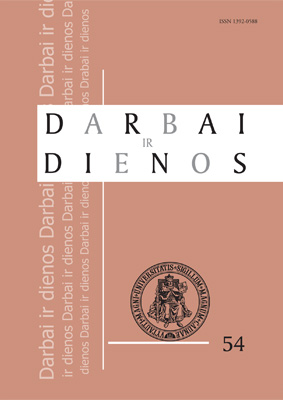Intelektualų neformalių grupių veikimo bruožai ir opozicinės nuostatos sovietinėje Lietuvoje
Characteristic Features and Oppositional Attitudes of Informal Intellectual Groups in Soviet Lithuania
Author(s): Aurimas ŠukysSubject(s): Cultural Essay, Political Essay, Societal Essay
Published by: Vytauto Didžiojo Universitetas
Keywords: grupės; opozicija; sovietmetis; Lietuva; opposition; groups; soviet; Lithuania
Summary/Abstract: Šio tyrimo tikslas – atskleisti Lietuvos intelektualų neformalių grupių veikimo bruožus ir opozicines nuostatas totalitarinio režimo sąlygomis legalioje ar pusiau legalioje erdvėje. Tam panaudotas interviu, taikyti aprašomasis, analitinis ir lyginamasis metodai. Apklausti žinomi Lietuvos intelektualai, kurie galimai prisidėjo prie opozicinių nuostatų ir su jomis susijusių veiksmų sovietinėje Lietuvoje formavimo ir (ar) palaikymo. Atliekant tyrimą sąmoningai pasirinktas legalus ar pusiau legalus sovietinės Lietuvos gyvenimas. Rezistencijai ir disidentinei veiklai skirta ne viena studija. Pagaliau įkurtas Gyventojų rezistencijos ir genocido tyrimo centras. Tačiau tik dabar mokslininkų dėmesio sulaukia legalios bei neformalios pastangos sovietiniais metais išsaugoti savo ar kitų individų tapatybę, kūrybos laisvę tautinėje, kultūrinėje, intelektualinėje, profesinėje srityje. The article presents a description of social networks and activities of various informal groups among intellectuals in the late soviet period in Lithuania. The analysed material includes 9 interviews, memoirs, diaries, and KGB documents. Because of these networks and certain official privileges which intelligentsia obtained in Soviet public life to demonstrate alternative virtues and discourses, official and unofficial culture could sometimes escape ideological control. Such non- systematic activities took different forms: publication of classical philosophical texts by “Mintis” publishing house, unideologized lectures read at universities, a movement for authentic folklore and protection of cultural heritage, search for individual forms of expression in art and poetry, etc. Though most of the new unidealogized ideas were sooner or later brought to an end, intellectuals, who constructed groups with trust, solidarity, and civic engagement, found new forms of nonconformist behaviour. On the other hand, such a public engagement in soviet life demanded to obey (voluntarily or not) certain ideological rules. The ideological regime aimed at building “a new man”. To resist this, Lithuanian intellectuals strived to construct an alternative “us” identity, which was an effort to demonstrate “our” distinctiveness from “them” (i.e. people which were loyal to or manipulated by the Soviets). Even though some dissidents, emigrants or other individuals with oppositional attitudes participated in “our” groups, they had a different civic identity which was constructed in opposition to the Soviet rule. They can be considered as “others” from the perspective of “our” groups. These three collective identities - “others”, “us”, and “them”- as well as interaction among them provided a possibility to search for alternative aims under the complicated circumstances of social, economic and political Soviet life.
Journal: Darbai ir dienos
- Issue Year: 2010
- Issue No: 54
- Page Range: 9-35
- Page Count: 27
- Language: Lithuanian

